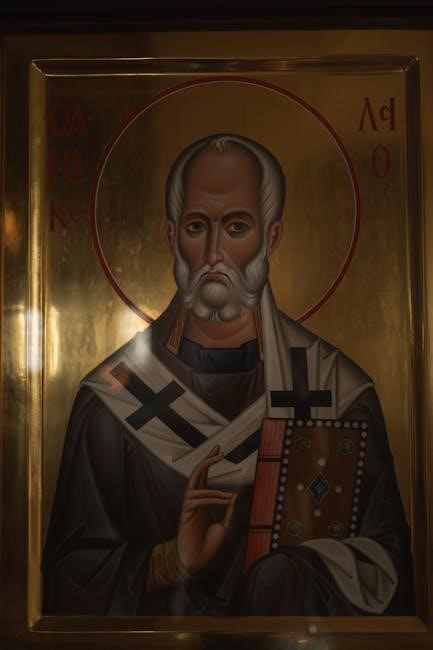wayne grudem systematic theology pdf
Wayne Grudem’s Systematic Theology is a comprehensive exploration of Christian doctrine‚ offering a clear‚ accessible understanding of theology. Its structured approach makes complex concepts understandable.
Overview of Systematic Theology
Systematic theology is the organized study of Christian doctrines‚ aiming to present a cohesive understanding of biblical truths. It structures theology thematically‚ addressing topics like the nature of God‚ humanity‚ Christ‚ the Holy Spirit‚ the church‚ and the future. This approach ensures comprehensive coverage of faith principles‚ making complex concepts accessible. Grudem’s work exemplifies this method‚ offering a thorough exploration of Christian teachings in a logical framework. Its availability in formats like PDF enhances accessibility‚ allowing widespread study and application. Systematic theology’s significance lies in its ability to deepen believers’ understanding of Scripture and equip them for practical Christian living‚ fostering both spiritual growth and informed discipleship.
Who is Wayne Grudem?
‚ which is widely regarded as a cornerstone of contemporary evangelical scholarship. Grudem has taught theology at several institutions‚ including Phoenix Seminary‚ and has been a key figure in shaping evangelical thought. His work emphasizes the authority of Scripture and practical application of theology. The availability of his systematic theology in PDF format has made it accessible to a global audience‚ contributing significantly to theological education and Christian discourse. Grudem’s contributions have been praised for their clarity and depth‚ making complex theological concepts understandable for both scholars and laypeople alike.
Significance of Grudem’s Work in Christian Theology
Wayne Grudem’s Systematic Theology holds immense significance in Christian theology as it provides a comprehensive‚ biblically grounded framework for understanding doctrine. Its clarity and accessibility have made it a vital resource for both scholars and laypeople‚ bridging the gap between academic theology and practical application. The availability of the book in PDF format has further expanded its reach‚ enabling global access to its teachings. Grudem’s work is particularly valued within evangelical circles for its commitment to Scripture’s authority and its emphasis on the transformative power of theology in everyday life. His systematic approach has shaped theological education and discourse‚ ensuring its enduring relevance in contemporary Christian thought.

Key Features of Wayne Grudem’s Systematic Theology
Grudem’s work is renowned for its comprehensive coverage‚ clear organization‚ and accessibility‚ making complex theology understandable for diverse audiences. Its availability in PDF enhances accessibility.
Structure and Organization of the Book
Wayne Grudem’s Systematic Theology is meticulously organized into 57 chapters‚ each focusing on a specific doctrine. The book begins with an introduction to systematic theology‚ followed by foundational topics such as the doctrine of God‚ humanity‚ Christ‚ the Holy Spirit‚ the church‚ and future events. Each section is logically structured to build upon previous concepts‚ ensuring a comprehensive understanding. The inclusion of charts‚ diagrams‚ and study questions enhances clarity and engagement. This systematic approach makes the theology accessible to both scholars and lay readers‚ facilitating deeper biblical understanding. The PDF format preserves this structure‚ maintaining readability and ease of navigation.
Unique Aspects of Grudem’s Approach
Wayne Grudem’s Systematic Theology stands out for its emphasis on practical application‚ distinguishing it from purely theoretical works. Grudem integrates biblical teaching with real-life scenarios‚ making theology relatable and actionable. His clear‚ conversational style ensures accessibility for diverse readers. The inclusion of personal anecdotes and contemporary examples further enhances engagement. Additionally‚ Grudem’s commitment to evangelical theology‚ combined with a balanced approach to controversial topics‚ fosters unity and understanding among believers. The PDF version retains these unique elements‚ preserving the book’s dynamic and transformative impact for digital readers. This holistic approach has made Grudem’s work a trusted resource for both personal growth and theological education.
Target Audience and Accessibility
Wayne Grudem’s Systematic Theology is designed for a broad audience‚ including theology students‚ pastors‚ and laypeople seeking to deepen their biblical understanding. The book’s clear‚ conversational style ensures accessibility to readers of varying theological backgrounds. Grudem’s approach avoids overly technical language‚ making complex doctrines understandable. The availability of the book in PDF format further enhances its accessibility‚ allowing readers to engage with the content digitally. This format is particularly beneficial for students and researchers‚ enabling easy navigation and reference. The structured organization of the book‚ with clear headings and summaries‚ also aids in comprehension. As a result‚ Grudem’s work serves as a valuable resource for both academic and personal theological growth.

Major Doctrines Covered in the Book
Wayne Grudem’s Systematic Theology covers major doctrines such as the nature of God‚ humanity‚ Christ‚ the Holy Spirit‚ the Church‚ and the future‚ providing a comprehensive theological framework.
The Doctrine of God
Wayne Grudem’s systematic theology thoroughly explores the doctrine of God‚ emphasizing His attributes such as sovereignty‚ omnipotence‚ and love. Grudem meticulously examines God’s nature‚ revealing His trinitarian essence and divine providence. The discussion also delves into the relationship between God’s foreknowledge and human freedom‚ asserting a compatibilist view. Grudem’s analysis is deeply rooted in biblical exegesis‚ ensuring a theologically sound understanding of God’s character and actions. This section serves as a foundational pillar for the rest of the book‚ providing readers with a robust framework for comprehending the divine.
The Doctrine of Humanity
Wayne Grudem’s systematic theology delves into the doctrine of humanity‚ focusing on the creation of humans as image-bearers of God. He emphasizes the dignity and uniqueness of humanity‚ rooted in Genesis 1:27. Grudem discusses the implications of being made in God’s image‚ including rationality‚ morality‚ and relational capacity. He also examines the effects of the Fall‚ detailing how sin impacts human nature. Grudem’s approach integrates biblical teachings with practical insights‚ addressing gender roles and the value of human life. This section provides a comprehensive understanding of human nature‚ equipping readers to appreciate their purpose and moral responsibility.
The Doctrine of Christ
Wayne Grudem’s systematic theology thoroughly explores the doctrine of Christ‚ focusing on His divine and human natures. Grudem emphasizes the significance of Christ’s virgin birth‚ sinless life‚ and substitutionary atonement. He examines the theological implications of Christ’s resurrection and ascension‚ highlighting their centrality to Christian faith. Grudem also discusses Christ’s roles as Prophet‚ Priest‚ and King‚ providing a holistic view of His ministry. The section underscores the importance of understanding Christ’s work for salvation and the empowerment of believers. Grudem’s biblical analysis offers clarity and depth‚ enabling readers to grasp the foundational truths about Jesus Christ.
The Doctrine of the Holy Spirit
Wayne Grudem’s systematic theology provides a detailed examination of the Holy Spirit’s role and nature. He affirms the Spirit as the third person of the Trinity‚ coequal with the Father and Son. Grudem discusses the Spirit’s work in creation‚ regeneration‚ and sanctification‚ emphasizing His indwelling presence in believers. He addresses spiritual gifts‚ advocating for a cessationist view‚ while encouraging the use of edifying gifts. Grudem also explores the Spirit’s role in the church’s mission and personal holiness. His biblical insights help readers understand the Holy Spirit’s transformative power and relevance in Christian living‚ offering practical applications for spiritual growth and ministry.
The Doctrine of the Church
Wayne Grudem’s systematic theology thoroughly explores the doctrine of the church‚ emphasizing its role as the body of Christ and the community of believers. He discusses the church’s nature‚ purpose‚ and government‚ advocating for a biblical model of leadership. Grudem examines key aspects such as the church’s unity‚ holiness‚ and mission‚ highlighting its responsibility to fulfill God’s redemptive purposes. He also addresses practical matters like church discipline‚ worship‚ and the sacraments‚ providing a balanced perspective rooted in Scripture. Grudem’s treatment of the church equips believers to understand their identity and function within the broader body of Christ‚ fostering a deeper commitment to corporate worship and service.
The Doctrine of the Future
Wayne Grudem’s systematic theology delves into the doctrine of the future‚ focusing on eschatology and God’s ultimate plan for humanity. He examines biblical teachings on the return of Christ‚ the millennium‚ and the final judgment. Grudem explores themes like the rapture‚ heaven‚ and hell‚ providing a thorough analysis of differing views within Christian theology. He emphasizes the hope and assurance found in Christ’s promises‚ encouraging believers to live with eternal perspective. Grudem’s discussion on the future is both informative and encouraging‚ helping readers understand and prepare for the culmination of God’s redemptive plan.

Key Themes and Emphases
Grudem emphasizes the biblical foundation of theology‚ its practical application in daily life‚ and a strong evangelical perspective‚ making theology accessible and relevant for all believers.
Biblical Foundation of Theology
Wayne Grudem’s Systematic Theology is deeply rooted in Scripture‚ emphasizing the Bible as the ultimate authority for theological inquiry. Grudem meticulously references biblical passages to support each doctrine‚ ensuring that his teachings align with God’s Word. This approach underscores the importance of sola Scriptura‚ affirming that all theological understanding must flow from the Bible. By integrating thorough exegesis and a commitment to evangelical principles‚ Grudem’s work provides a reliable and biblically grounded framework for understanding Christian doctrine. This focus on Scripture ensures that the theology presented is both authentic and applicable‚ making it a trusted resource for scholars and laymen alike.
Practical Application of Theology
Wayne Grudem’s Systematic Theology emphasizes the practical application of theological truths in everyday life. Grudem consistently bridges doctrine with real-world implications‚ encouraging believers to live out their faith authentically. Each doctrine explored‚ from the nature of God to the work of the Holy Spirit‚ is connected to its relevance in personal and communal Christian living. This approach ensures that theology is not merely an academic pursuit but a transformative force in believers’ lives. By focusing on application‚ Grudem equips readers to integrate biblical teachings into their decisions‚ relationships‚ and ministries‚ fostering spiritual growth and a deeper walk with Christ.
Evangelical Perspective
Wayne Grudem’s Systematic Theology is deeply rooted in an evangelical perspective‚ emphasizing the authority of Scripture‚ the centrality of the gospel‚ and the importance of personal faith in Christ. Grudem’s work reflects a commitment to evangelical theology‚ prioritizing biblical inerrancy and the transformative power of the Holy Spirit. His approach resonates with evangelical communities‚ offering a balanced view that integrates theological depth with practical application. The book’s evangelical emphasis ensures that readers are equipped with a robust understanding of Christian doctrine‚ aligning with historic evangelical traditions while addressing contemporary theological issues. This perspective makes Grudem’s work a trusted resource for evangelical scholars‚ pastors‚ and laypeople alike.

Comparison with Other Theological Works
Grudem’s theology aligns closely with Reformed traditions but offers unique accessibility and practical insights‚ distinguishing it from works like Calvin’s Institutes in clarity and modern application.
Similarities with Reformed Theology
Grudem’s systematic theology shares significant similarities with Reformed theology‚ particularly in its emphasis on the sovereignty of God‚ predestination‚ and the authority of Scripture; Both traditions uphold the five points of Calvinism‚ such as total depravity and irresistible grace‚ which are central to Reformed thought. Additionally‚ Grudem’s view of God’s providence and the covenant of grace aligns closely with Reformed perspectives. His structured‚ doctrinal approach mirrors the systematic method of Reformed theologians like John Calvin. While Grudem’s work is distinct‚ its foundation in Reformed theology ensures consistency with historical Reformed teachings‚ making it a valuable resource for those steeped in this tradition.
Differences from Other Theological Systems
While Grudem’s systematic theology aligns with many evangelical traditions‚ it differs from other systems in its distinct approach to certain doctrines. Unlike some Reformed perspectives‚ Grudem advocates for gender roles in church leadership‚ a stance that sets his work apart. Additionally‚ his views on the continuation of spiritual gifts in the modern church contrast with cessationist Reformed theology. Grudem also diverges from Arminian theology by emphasizing God’s sovereignty in salvation. His integration of biblical theology with practical application further distinguishes his work from more abstract theological systems. These unique perspectives contribute to the diversity of evangelical thought and provide a fresh lens for understanding Christian doctrine.

Wayne Grudem’s Biblical Hermeneutics
Grudem emphasizes a literal‚ grammatical-historical approach to Scripture‚ prioritizing the author’s intended meaning. His systematic theology reflects this method‚ ensuring clarity and accessibility for evangelical understanding.
Approach to Scripture
Wayne Grudem’s systematic theology underscores a literal‚ grammatical-historical approach to Scripture‚ viewing the Bible as the inerrant‚ authoritative Word of God. He emphasizes the importance of interpreting texts within their original context‚ avoiding allegorical or subjective readings. This method ensures that theological conclusions remain grounded in biblical truth. Grudem’s approach is both scholarly and accessible‚ making his work a valuable resource for understanding Christian doctrine. His commitment to Scripture’s authority is central to his systematic theology‚ providing a clear framework for applying biblical principles to modern life and theology. This approach has been widely praised for its clarity and faithfulness to the text.
Interpretation Methods
Wayne Grudem employs a literal‚ grammatical-historical method for interpreting Scripture‚ ensuring that biblical texts are understood in their original context. He avoids allegorical interpretations‚ emphasizing the importance of allowing Scripture to speak for itself. Grudem also integrates theological systematicity‚ organizing doctrines coherently while maintaining their biblical basis. His approach balances exegesis and theological synthesis‚ making his work both academically rigorous and pastorally relevant. This methodological consistency provides readers with a clear and reliable framework for understanding Christian theology‚ ensuring that his systematic theology remains a trusted resource for scholars and laypersons alike.

The Role of Systematic Theology in Christian Life

Systematic theology provides a framework for understanding Christian doctrine‚ enabling believers to apply biblical truths in daily life and deepen their spiritual growth and obedience to God.
Understanding the Importance of Theology
Theology serves as the foundation for understanding God’s nature‚ humanity‚ and salvation. It provides a systematic framework for interpreting Scripture‚ enabling believers to grasp the coherence of Christian doctrine. By studying theology‚ individuals gain clarity on essential truths‚ fostering a deeper relationship with God. It equips Christians to apply biblical principles in daily life‚ addressing moral‚ ethical‚ and spiritual challenges. Theology also unites believers across cultures and generations‚ offering a shared language and understanding of faith. Grudem’s work emphasizes the practical relevance of theology‚ ensuring it remains accessible and transformative for everyday living‚ thereby enriching both personal and communal Christian experiences.
Applying Theology in Everyday Life
Wayne Grudem’s Systematic Theology emphasizes the practical application of theological truths in daily life. It bridges the gap between faith and real-world challenges‚ providing guidance for ethical decision-making and spiritual growth. By understanding doctrines such as God’s sovereignty‚ humanity’s purpose‚ and Christ’s redemption‚ believers can navigate life’s complexities with confidence. Grudem’s work encourages Christians to live out their faith authentically‚ applying biblical principles to relationships‚ work‚ and societal issues. This approach transforms theology from an abstract concept into a living‚ breathing guide for everyday living‚ fostering a deeper connection with God and a more meaningful impact in the world.

Wayne Grudem’s Systematic Theology in PDF Format
The PDF version of Wayne Grudem’s Systematic Theology offers convenience and accessibility‚ enabling easy digital access to its comprehensive theological insights and facilitating deeper study and reference.
Availability and Accessibility
The PDF version of Wayne Grudem’s Systematic Theology is widely available online‚ making it easily accessible for readers worldwide. This digital format allows for convenient downloading and sharing.
Benefits of the Digital Version
The PDF version of Wayne Grudem’s Systematic Theology offers numerous advantages. It is easily searchable‚ allowing quick access to specific doctrines and topics. The digital format also enables annotations and highlighting‚ facilitating deeper study and personal notes. Additionally‚ the PDF is portable and can be accessed on various devices‚ making it ideal for both academic and personal use. Its availability in digital form ensures that this theological resource remains widely accessible to a global audience‚ promoting understanding and application of biblical doctrines in contemporary contexts. This convenience enhances the reader’s ability to engage with Grudem’s comprehensive theological insights efficiently and effectively.

Critical Analysis and Reviews
Wayne Grudem’s Systematic Theology is widely praised for its clarity and depth‚ yet some scholars critique its conservative approach as overly rigid in addressing contemporary theological debates.
Positive Reception and Endorsements
Wayne Grudem’s Systematic Theology has received widespread acclaim for its clarity‚ depth‚ and accessibility. Scholars and pastors alike praise its meticulous biblical grounding and practical applications. Many endorse it as a cornerstone of evangelical theology‚ commending its balanced approach to controversial topics. The book’s structured format and clear language make it an invaluable resource for both theological students and laypeople. Its emphasis on the transformative power of doctrine resonates deeply with believers seeking to integrate faith into daily life. This work is widely regarded as a modern classic‚ bridging the gap between academic theology and practical Christian living.
Critiques and Controversies
While Wayne Grudem’s Systematic Theology is widely praised‚ it has also faced critiques. Some scholars argue that his complementarian views on gender roles are overly restrictive and not sufficiently supported by Scripture. Additionally‚ certain interpretations‚ such as his stance on the Trinity‚ have sparked theological debates. Critics contend that Grudem’s approach sometimes oversimplifies complex doctrines‚ potentially leading to misunderstandings. Furthermore‚ his integration of political activism with theology has been controversial‚ with some arguing it blurs the line between faith and ideology. Despite these critiques‚ Grudem’s work remains influential‚ though readers are encouraged to engage critically with its content.
Wayne Grudem’s Systematic Theology remains a vital resource for understanding Christian doctrine. Its availability in PDF ensures accessibility for scholars and laypeople‚ fostering deeper theological engagement globally.
Final Thoughts on Grudem’s Systematic Theology
Wayne Grudem’s Systematic Theology is a monumental work that has shaped modern evangelical understanding of Christian doctrine. Its clarity and accessibility make it invaluable for both scholars and laypeople. The PDF version ensures widespread accessibility‚ allowing readers worldwide to engage with its teachings. Grudem’s systematic approach covers essential doctrines‚ from the nature of God to the future‚ providing a holistic view of theology. His emphasis on biblical authority and practical application sets this work apart. While some may critique certain interpretations‚ the book’s impact remains undeniable. It serves as a foundational resource for anyone seeking to deepen their theological understanding and apply it in everyday life.
Recommendations for Further Study
For deeper exploration‚ readers can access the PDF version of Wayne Grudem’s Systematic Theology‚ which offers a comprehensive study of Christian doctrine. Supplementing this with biblical commentaries and theological journals can enhance understanding. Engaging with study groups or online forums provides practical insights and diverse perspectives. Additionally‚ exploring works by other evangelical scholars can broaden one’s theological framework. Utilizing digital tools for referencing and note-taking can facilitate a more immersive study experience. Lastly‚ applying theological concepts in personal reflection and community service fosters a balanced approach to spiritual growth and intellectual development.

